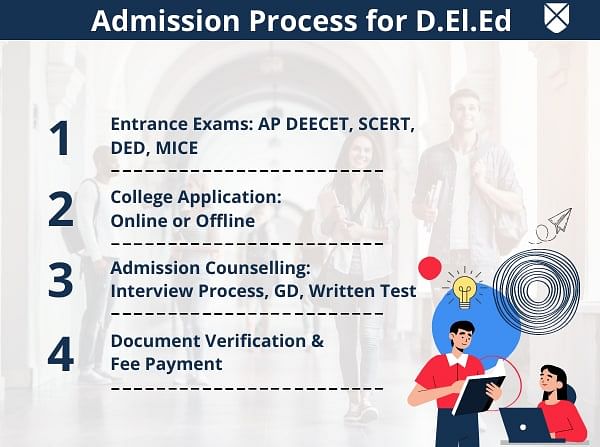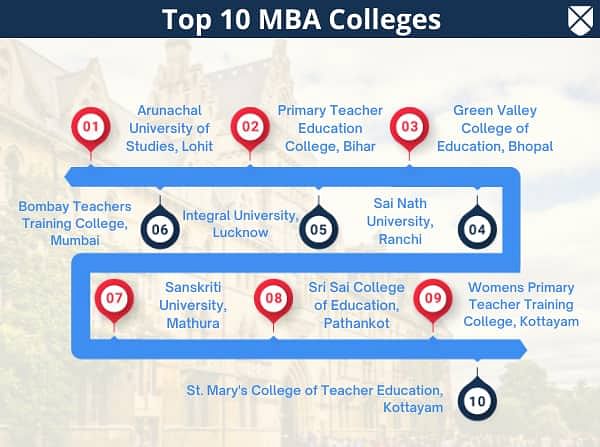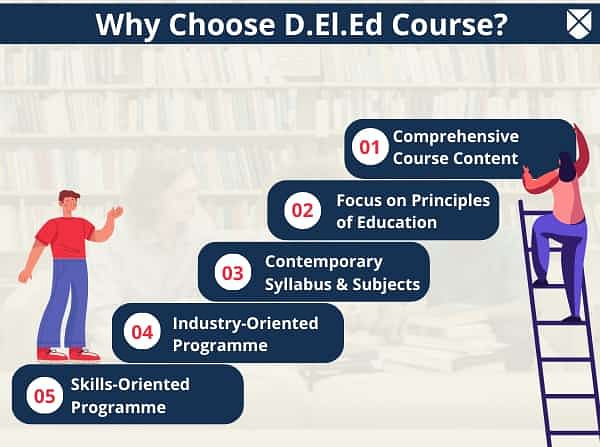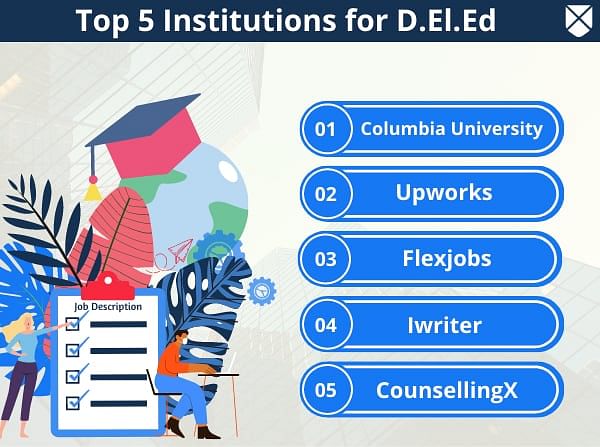D.EL.Ed: Full Form, Course Details, Eligibility, Admission, Fees

DElEd or Diploma in Elementary Education is a 2-year undergraduate diploma course that deals with various teaching skills, historical patterns, and current classroom trends. The main aim of the Diploma in Elementary Education course is to develop every student's motivation, philosophy, and dedication to a career in elementary education, along with some other disciplines such as psychology and philosophy.
Table of Contents
- About D.El.Ed Course
- DELEd Eligibility Criteria
- DELEd Admission Process 2024
- Types of DELEd Course
- DELEd Specializations
- Popular Entrance Exams for DELEd
- Top 10 D.El.Ed Colleges in India
- DELEd Course Fees in India
- What is the DELEd Bridge Course?
- Syllabus and Subjects for DELEd
- Why Choose DELEd Course?
- DELEd Course Comparison
- Preparation Tips For DELEd
- Scope For Higher Education
- Salary Of a DELEd Graduate
- Career Options After DELEd
- Skills That Make You The Best DELEd Graduate
D.El.Ed Course Details
| Degree | Diploma |
| Full Form | Diploma in Elementary Education |
| Duration | 2 Years |
| Age | 17 years |
| Minimum Percentage | 50% |
| Average Fees | ₹5K - 2 LPA |
| Similar Options of Study | B.Ed, BA (Education), etc. |
| Average Salary | INR 2 - 5 LPA (Source: Payscale) |
| Employment Roles | Primary Teacher, Tutor, Administrator, Assistant Dean, Researcher, Content Reviewer, Career Counsellor, Content Writer |
About D.El.Ed Course
D.El.Ed full form is Diploma in Elementary Education, the course duration is two years, and the course structure is divided into four semesters. The DELEd course aims to improve students' adaptability and teachers' ability to deliver high-quality instruction to students. DELEd syllabus and subjects includes study of pedagogy of environmental studies, fine arts and education, communication, etc. The D.EL.Ed Job Scope is extensive, ranging from Elementary School Teacher, Librarian to Administrative representative.
DELEd Eligibility Criteria
Admission for DELEd in India requires the aspirants to complete their 10+2 with a minimum of 50% aggregate marks from any recognized board of education. Also, along with the basic essential DELEd eligibility criteria, students must have cleared the standard entrance examination such as DED, MICE, SCERT, etc. The minimum age for applying for a DELEd course is 17 years of age.
DELEd Admission Process 2024
The admissions to the D.El.Ed course can be done through both online and offline methods. DELEd admissions are also available from the website or by directly visiting the college's admissions office. Below are some questions regarding the details of the admission process in general:

Listed below are the various procedures to get D.El.Ed admission:
How to Apply?
Students can apply for the admission process through both the offline and the online mode. For the offline admission process, students must visit the college admissions office, collect the application form, submit the details and make the registration payment. Regarding the online procedure, students need fill in the details on the application form and make the registration payment online.
Selection Process
The selection for DELEd best colleges in India is either based on merit or an entrance-based selection process. Some of the top colleges for DELEd offer admissions strictly based on the candidate’s performance in the entrance examinations. The students have to appear for entrance examinations such as AP DEECET, DED, etc., to name a few to qualify for the course.
Types of DELEd Course
Aspirants can pursue the DELEd course in the full-time , part-time mode and distance mode. Below are the types of D.El.Ed courses in detail:
Full-Time D.El.Ed
The DELEd course is a two-year undergraduate diploma course divided into four semesters. In this subject, practical exposure is aligned with academic content. The advantage of a full-time course is that students can gain much more exposure and experience and increase their learning curve.
Part-Time D.El.Ed
A part-time DELEd course is a two-year course. Professionals who are currently employed and unable to take time off for full-time study can benefit greatly from the part-time D.El.Ed course program.
Distance D.El.Ed
DELEd courses help students gather knowledge and training about student teaching at the primary level. Few universities offer distance D.El.Ed programs. The scope for admission is that students have to clear their 10+2 Board examination with at least 50% marks in aggregate.
DELEd Specializations
There is no such specialization for DELEd course, but students can join a sector as per their interest. Listed below are some sectors students can join after the completion of D.El.Ed course
- Primary Schools
- Secondary & Higher Secondary Schools
- Colleges
- University
- Private schools
Popular Entrance Exams for DELEd
There are many entrance exams for the DELEd course for which the students should attend. Students must write the entrance exams and have a good merit score from the 10+2 classes to ensure admission for the course. Some of the very best and mandatory D.El.Ed entrance exams are as follows:
A Quick Glance at the D.El.Ed Entrance Exams
The DELEd course entrance exams include various questions to analyze the aspirants' knowledge abilities. The test includes:
- The entrance tests conducted in the entrance exams are objective and contain multiple-choice questions.
- The exam is conducted both in online and offline mode.
- The exam assesses the quantitative (mathematics) and verbal ability (English) of the student along with their general knowledge, analytical/logical reasoning, and knowledge of current affairs.
Top 10 D.El.Ed Colleges in India
Various institutions in India have included the DELEd course in their curriculum. Listed below are the top D.EL.Ed colleges in India:
| Sl.No. | Name of the College | Average Fees |
| 1 | Arunachal University of Studies, Lohit | INR 70,000 PA |
| 2 | Primary Teachers Education College, Bihar | INR 30,000 PA |
| 3 | Green Valley College of Education, Bhopal | INR 32,000 PA |
| 4 | Sai Nath University, Ranchi | INR 47,000 PA |
| 5 | Integral University, Lucknow | INR 50,00 PA |
| 6 | Bombay Teachers Training College, Mumbai | INR 36,000 PA |
| 7 | Sanskriti University, Mathura | INR 30,000 PA |
| 8 | Sri Sai College of Education, Pathankot | INR 44,000 PA |
| 9 | Women Primary Teachers Education College, Chandwara | INR 25,000 PA |
| 10 | St. Mary’s College of Teacher Education, Kottayam | INR 30,600 PA |

DELEd Course Fees in India
D.El.Ed course fees range from INR 5 K - 2 LPA, and they may even vary depending upon the facilities and amenities provided at the college/university and the level of education provided. The DELEd fees structure for the colleges is as follows:
|
College Name |
Fees Per Annum |
|
Bombay Teachers Training College, Bombay |
INR 36,000 |
|
Integral University, Lucknow |
INR 50,000 |
|
Green Valley College of Education, Bhopal |
INR 35,000 |
|
St. Bede’s College, Shimla |
INR 38,000 |
|
YBN University, Ranchi |
INR 65,000 |
What is the DELEd Bridge Course?
The National Institute of Open School (NIOS) offers the Professional Development Programme for Elementary Teachers (PDPET), a preparatory DELEd Bridge Course helps in-service teachers gain skills as primary school teachers. The duration of the PDPET course is 6 months.
Syllabus and Subjects for DELEd
The syllabus and subjects for the D.El.Ed courses are structured in such a way so that the students get theoretical and practical aspects of the course. The DELEd in India has various assignments, internships, quizzes, vivas, and project submissions as part of the degree course.
Some of the essential subjects of the D.El.Ed courses are:
- Childhood and the development of children
- Contemporary society
- Towards understanding the self
- Pedagogy of English language
- Work and education
- Proficiency in English
Read More: D.El.Ed Syllabus and Subjects
Why Choose DELEd Course?
The answer to "Why choose a DELEd degree course?" can be explained in detail through the following points:

What is a DELEd all About?
DELEd is a 2-year undergraduate degree course that deals with specific skills and techniques that students should possess in certain areas, such as teaching, researching, counselling, writing, etc. The essential subjects of the course are Contemporary society, Education Society, Work and education, Leadership and Change, etc.
What Does a DELEd Graduate Do?
The elementary school teachers develop lesson plans, teaching structure, grades, class assignments, administer tests, and assess student's performance on various criteria.
Motivating Pupils: Teaching is a responsible profession. The most important job of a DELEd graduate is to motivate and boost the students' minds in the classroom.
Reasons Why DELEd Can Fetch You a Rewarding Career
There is a good demand for graduates of the DELEd course in the employment market as there are several primary schools and tuition centres. The job is also different from other streams as aspirants have to work with schools teaching primary level students.
Decent Salary and Job Growth: D.El.Ed scope and salary in India is around INR 4 LPA. There is massive potential for growth in this field as the work environment is generally good.
Read More: D.El.Ed Jobs & Scope
DELEd Course Comparison
D.El.Ed stands for Diploma in Elementary Education and is typically catered to students interested in and inclined towards education and teaching. Below is a comparison of the DELEd course with other courses:
D.EL.Ed vs B.Ed
The table below showcases the differences between D.EL.Ed and B.Ed:
|
Course |
D.EL.Ed |
B.Ed |
|
Full Form |
Diploma in Elementary Education |
Bachelor of Education |
|
Stream |
Arts and Humanities |
Arts and Humanities |
|
Course Duration |
2 years |
2 years |
|
Eligibility |
10+2 in any stream with 50% aggregate |
Graduation in any stream with 50% aggregate |
|
Entrance Exams |
CTET, NIOS DE.ELEd, Goa DE,EL.Ed , etc |
CUET, RIE CEE, IPU CET, BHU BEd, etc |
|
Top Colleges |
Bombay teachers training college, Jamia Millia Islamia University, Integral University |
Jamia Millia Islamia University, Amity University, Pacific University, Delhi University |
|
Fees |
INR 5000 - 2 LPA |
INR 10,000 - 1.5 LPA |
Preparation Tips For DELEd
Before determining whether to enroll in DELEd course, students should consider a number of crucial aspects. Students can succeed in their studies, pass the course, and ace the examinations by putting these important study ideas into practice:
Syllabus Completion: The course syllabus must be well understood by the learner. This crucial first step marks the start of the preparation procedure.
Exam Format: Understand the format of the exam and the kinds of questions that are typically asked. The likelihood of the kids receiving multiple-choice questions is relatively high.
Review of Key Topics: Students should pay greater attention to these subjects because they are tested on more frequently.
Practice: Utilize sample exams and test questions from prior years to prepare for the questions.
Scope For Higher Education
The DELEd course has a broad scope giving graduates opportunities to enhance their knowledge in the field of teaching can opt for a B.Ed degree after course completion. Some of the higher education options after DELEd is as follows:
Salary Of a DELEd Graduate
The DELEd salary in India ranges from INR 2 LPA - 5 LPA and some additional benefits such as bonuses and incentives. The graduates' salary and the additional benefits may vary depending on the graduates' skills, talent, and experience.
Read More: D.El.Ed Salary
Career Options After DELEd
After completing the DELEd course in India and abroad, many job opportunities are opened for the graduates with a decent salary and some additional benefits in public and private sectors of various reputed organisations operating in India and abroad.

Some of the very best career options for the graduates after the course of D.El.Ed in the government sector is as follows:
- Education Counsellor
- Junior Teacher
- Tutor
- Librarian
Some of the very best DELEd career in the private sector are:
- Article Writer
- Content Writer
- Career Counsellor
- Education Developer
- Head Teacher
Skills That Make You The Best DELEd Graduate
Teachers need to have all their faculties intact as teaching comes with a huge responsibility. For this reason, it is essential that DELEd students develop the following skills while studying the course:
- Communication Skills
- Empathy
- Analytical Skills
- Critical Reasoning
- Organization Skills
- Leadership Skills
D.El.Ed Fee Structure
FAQs on D.El.Ed
Q: Is the NIOS D.El.Ed NCTE approved?
Q: What is the difference between a D.El.Ed and a B.Ed?
Q: What is the salary of D.El.Ed in India?
Q: What jobs can I get after D.El.Ed?
Q: What is the eligibility requirement to D.El.Ed from IGNOU?
Q: What is the scope of D.El.Ed course?
